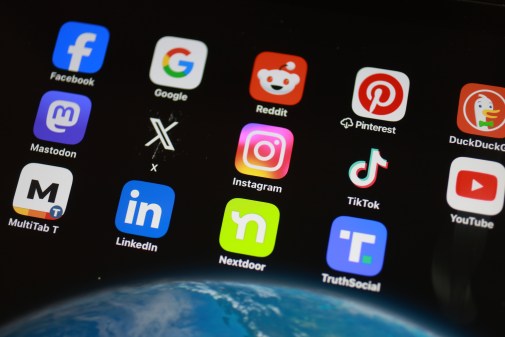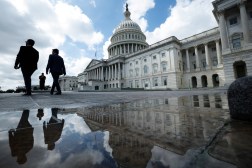The reason to ban TikTok has nothing to do with data security

An old man is being yelled at in Cantonese as he scurries through the concourse of Hong Kong’s airport. The young protestors yelling push papers into his chest. It’s clear they’re mad. His glasses slip from his nose a few times. The paper pushing turns to physical pushing. He’s backed into a corner, fearful. Before the two-minute clip is up, you feel bad for him.
That was mainland China’s first look at pro-democracy protests in Hong Kong arriving via TikTok in July 2019. The subtitles on the video helped viewers in mainland China understand what was happening. From the couch in Dalian, China, this was my first exposure to the Hong Kong protests. While living with a host family during a language program in China, I had pledged to speak and consume information exclusively in Mandarin. It was how I consumed news, including videos like this one. Beijing’s manicured view of the pro-democracy protests was my first peek into the massive power of TikTok.
Today, most U.S. political discourse around TikTok is misguided. We focus on the news of China’s data theft and connect the dots from Experian, the U.S. Office of Personnel Management, Anthem Insurance, U.S. government payrolls and intellectual property theft to TikTok. If new information suggests China is up to no good (again) with TikTok, we are primed to believe that data theft is the real threat. But that’s not it at all. It’s our very public discourse that is at risk — not from theft, but malign influence.
Reports of a pending deal between the White House and TikTok to assuage security concerns underscores that Washington is missing the real issue when it comes to TikTok. Policymakers should realize that our lax data privacy laws mean Beijing can hoover up nearly all the same user data from online advertising companies that it could from TikTok, even if a deal could be struck to limit TikTok’s access to its own data. Without any meaningful online privacy laws on the books — and none in sight for the next Congress — forcing TikTok to store its data in the U.S. will not stop Beijing from acquiring data on Americans. Instead, policymakers should focus on the risk that TikTok allows for interference in our public square.
TikTok’s users are at risk of manipulation. Already, videos that broach heavy topics such as suicide must use special words to reach eyeballs and avoid censors. Valuable posts about suicide awareness must use replacement terms such as “unalive” to discuss death. But what are the words that we don’t know to avoid? Who controls this list? How does it change? Policymakers must understand that the administrative controls on TikTok’s platform that facilitate this type of censorship can just as easily be used against users posting content that the PRC disagrees with.
The number of congressional testimonies from U.S. social media platforms reflects our collective concern over the risk platforms can pose. But social media platforms justly moderate, censor and demote certain types of content. You can endorse Nazism online, but your post won’t get many views. It’s the right to speak, but not the right to be heard, that drives this line of thinking. For all the criticisms it endured, Facebook’s parent company Meta undertook meaningful steps to show how and who would make decisions on controversial cases of content moderation. American social media firms, despite the public spectacle by some political actors in the U.S., do not by-and-large censor our political discourse. In fact, the pushback against American social media firms demonstrates how vibrant our discussion around political discourse can be. For TikTok and any Chinese social media company operating abroad, the process is obviously different.
It comes down to our political systems. A simple call from Beijing to TikTok’s parent company ByteDance regarding new content to censor and that content all but disappears from the platform. No one at a U.S. social media firm is at risk of a late-night visit by the FBI for failure to comply with censorship requests from the president. For all the public truth telling and public boards that ByteDance could install, nothing will ever contravene Beijing’s veto. That’s the problem of TikTok. The social media platform that nearly a third of Americans use is operating from a country whose authoritarian political leadership can influence privately run businesses for state purposes.
A recent regulatory push by Beijing to review companies’ recommendation algorithms illustrates China’s position on the issue; however, the efficacy of evaluating algorithms is debatable. Some reports discuss tired and misinformed bureaucrats reviewing complex math. Yet other analysts contest this view — questioning what can be achieved by Beijing’s review of recommendation algorithms even with competent oversight. The best analysis of the rules indicate the regulations signal government priorities to society and within the bureaucracy. Regardless of what is technically possible, the People’s Republic of China’s interest in regulating algorithms forgoes any pretense of non-interference.
Beijing will not constantly seek to influence the operation of TikTok nor its content. Consistent interference and censorship are too likely to draw unwanted attention and risks TikTok’s market access for unclear and undetermined benefits. Instead, the platform could be strategically leveraged to quiet online discussion on issues that China cares most about — like Taiwan — in times of crisis or preceding military conflict. China can use its 2015 National Security Law to compel ByteDance to take specific actions while gagging it from disclosures, even those mandated by any potential deal with the U.S. For a country that approved one of its intelligence agents to purposefully cause a car accident with a congressional candidate to deter their candidacy, promoting particular videos of a political candidate’s gaffes or censoring videos mentioning human rights issues is not a stretch.
Despite the platform’s popularity, the risks posed by TikTok are too great for a responsible deal to be reached. If China were ruled by a different political system, TikTok would be welcome to compete in the American market. But that’s not the case. Our current arrangement allows a Leninist one-party state to have secret editorial control over content on one of America’s most popular social media apps. So, the U.S. should not allow TikTok to continue its operations in the U.S.
From the perspective of my host family, the Hong Kong pro-democracy movement committed error after error. Harassing the elderly. Shoving and beating police. Destroying a city. Only from outside China’s manicured media environment do we know that’s not the full picture. In times of crisis, that is precisely the type of vulnerability that Beijing will seek to leverage.
Dakota Cary is a consultant at Krebs Stamos Group where he provides insights to clients on China’s hacking teams, their capabilities and research, and the industrial policies that drive their behavior. Dakota previously worked at Georgetown University’s Center for Security and Emerging Technology on the CyberAI Project.




